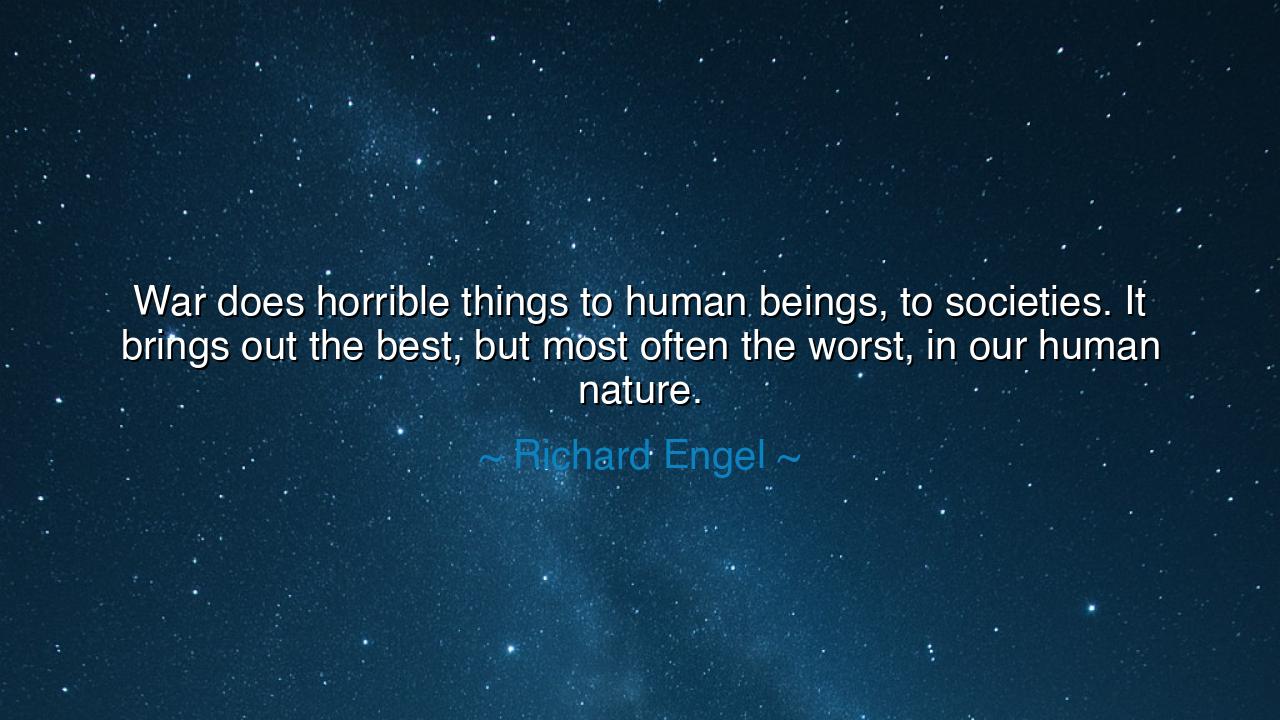
War does horrible things to human beings, to societies. It
War does horrible things to human beings, to societies. It brings out the best, but most often the worst, in our human nature.






The words of Richard Engel—“War does horrible things to human beings, to societies. It brings out the best, but most often the worst, in our human nature”—resound like the solemn tolling of an ancient bell, warning and teaching in equal measure. Here is a truth carved from the crucible of experience: war, that eternal and devastating force, is both a revealer and a corrupter. It exposes the hidden depths of courage, sacrifice, and loyalty, but also awakens the darkest impulses—greed, cruelty, and hatred—that lie dormant in the human soul.
The meaning of this reflection is that war is a mirror held up to society and to the human spirit. In its chaos and destruction, it forces humanity to confront its dual nature. Some rise to acts of heroism and selflessness, defending the weak or risking life for the greater good. Yet too often, the shadows of fear, rage, and ambition dominate, leaving trails of suffering, corruption, and moral decay. Engel reminds us that the crucible of war is not neutral—it magnifies what already exists within us, for better or worse.
History offers countless illustrations of this duality. Consider World War II, a conflict of unimaginable scale and horror. Amid the brutality, we saw acts of profound heroism: soldiers risking all to save comrades, civilians sheltering persecuted neighbors, and entire nations mobilizing to defeat tyranny. Yet alongside these noble acts, the war brought out the worst in human nature: the Holocaust, the firebombing of cities, and the suffering of countless innocents. Engel’s words echo in these pages of history, for war is a lens magnifying both virtue and vice.
The lessons of war are not limited to the battlefield. The Roman historian Tacitus wrote of how the ambitions of emperors and the passions of soldiers could uplift Rome or tear it asunder. Society itself is tested when conflict arises; the moral fiber of communities is strained, and decisions of conscience are thrust into the harsh light of survival. In every skirmish, siege, or uprising, the nature of man is revealed: some act with compassion and courage, while others succumb to cruelty or indifference.
The teaching for us, O seekers, is that we must understand both the potential and peril inherent in humanity. If war can awaken the best within us, so too can peace cultivate virtue when we are mindful. Yet if the worst lurks beneath the surface, it is a call for vigilance, reflection, and preparation—not for destruction, but for restraint. Engel’s observation urges us to recognize that moral clarity must be exercised constantly, lest the chaos of external conflict find an echo in the internal landscape of our souls.
Practically, this means cultivating empathy, courage, and self-awareness, even in times of relative peace. Study history to understand the choices of those who faced extremity. Train the mind and the spirit to act with justice, and hold fast to the virtues that war might tempt us to abandon. Recognize that every society, every individual, carries the potential for both nobility and cruelty—and that ethical vigilance is the bulwark against descending into the darkness revealed by conflict.
Therefore, let it be inscribed upon the hearts of all who listen: war does horrible things, yet it teaches. It unmasks the hidden qualities of humanity, revealing where courage, loyalty, and compassion dwell, and where fear, greed, and brutality may take root. Engel’s insight is a warning and a call: honor the virtues that war exposes, and guard against the vices that it magnifies. In understanding the human nature revealed in such extremes, we may hope to temper the violence of the world and cultivate the light within ourselves.






AAdministratorAdministrator
Welcome, honored guests. Please leave a comment, we will respond soon